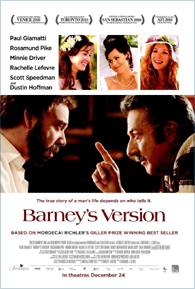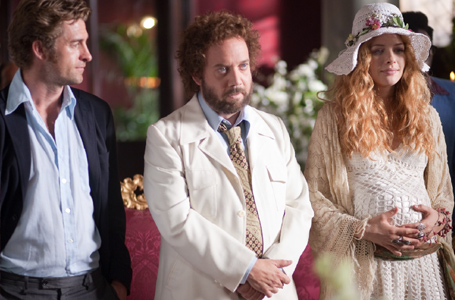
The plot of most Sandler movies is remarkably similar: his persona is generally that of a rather obnoxious, often Jewish man-child who while on a spree of sophomoric pranks, meets various shiksa Goddesses. Onscreen we have seen them played by the likes of Jennifer Aniston, Brooklyn Decker, Salma Hayek and Kate Beckinsale and even (the admittedly Jewish) Winona Ryder. That they will end up together in matrimonial bliss, Happily Ever After, is a given.
Barney’s Version plays like an Adam Sandler movie ripped from its cozy cocoon of formulaic wish-fulfillment and taken beyond the borders of Happily Ever After, into something resembling real life. Small wonder, given it’s an adaptation of a work by one of the most beloved of Canadian writers, Mordecai Richler.
The plot revolves around Barney Panofsky, a boozy, immature Montreal Jew who goes from being a hippie to producing a ridiculously terrible TV show, and his various relationships with his father (Dustin Hoffman); a low-ranking retired policeman, his best friend Boogie (Scott Speedman), and his three hot wives Clara (Rachelle Lefevre), the never-named ‘2nd Mrs P’ (Minnie Driver) and Miriam (Rosamund Pike). The bulk of the story deals with his courtship and marriage with his third and last wife Miriam, their life as a family together, and the heartbreaking final act of his life. There’s even a murder mystery thrown in for good measure, but I’ll not spoil the whodunnit all the same.
Barney is in general an obnoxious man-child, but aided by Michael Konyves’s moving and wise screenplay and under the fluid direction of Richard J Lewis, Giamatti allows us to make the emotional connection with Barney so that we don’t just see him as a funny guy as we might see a Sandler, but as a great personality. For all his annoying antics, Giamatti allows the audience to see the awfully decent human being that Barney is despite his lack of social grace or maturity. Just as delightful is Rosamund Pike, who in a luminous, quietly dignified performance, slowly reveals the heart of a long-suffering wife who knows that love is not blind but sees all the faults and forgives. Together they make one of the most winning couples onscreen this year.
While watching the credits one cannot help but notice the number of guiding lights of Canadian cinema who have chosen to lend their appearances to this film in small cameos from such remarkable filmmakers as Atom Egoyan, David Cronenberg, Denys Arcand and Ted Kotcheff. Despite the fact that its leads are largely British and American, there is little doubt that this was a film undertaken in the name of Canadian pride. Canada can be proud.

